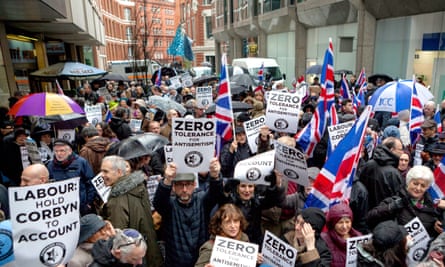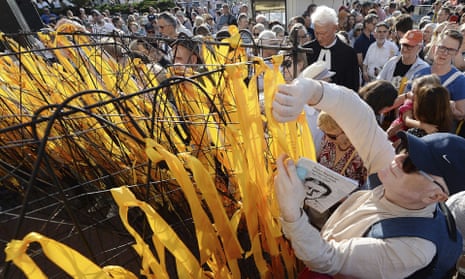This week I was in a house of mourning for an evening of prayers for the dead, part of what Jews call a shiva. We were there to remember a woman who had come to this country as a child refugee, having survived the Nazi concentration camp at Terezín, in what is now the Czech Republic. But I was struck by the words of the ancient prayers themselves, wondering what an outsider might make of them. For certain words kept recurring, as the holy texts invoked “the people of Israel” and asked that those grieving be comforted “among the mourners of Zion and Jerusalem”.
I found myself thinking that it would be useful for those following the ongoing, apparently neverending row about antisemitism and the Labour party to see what I was seeing. For they would have learned two relevant things. First, that if Jews are hyper-alert to threats, with a radar acutely sensitive to the early signs of danger, that is partly because the Holocaust, the murder of 6 million Jews, is, for us, a very recent memory: part of our own lived experience, barely one generation away. Second, that while so many may wish to draw a clear, bright line between Jews and Israel so that you can hate the latter while showing no hostility to the former, it is a bit fuzzier than that. Because the idea of Israel – not the concrete reality, but the idea of Israel and Zion and Jerusalem – is so deeply woven into Jewish tradition and culture that it’s there in the very words we utter at the most intimate moments of our lives.
The other thing they’d have heard if they had been at that shiva is a room full of Labour-supporting Jews sharing their fears about the party they, their parents and grandparents once called home. It’s the same conversation that Jews are now used to hearing, around synagogues and sabbath dinner tables, and which found expression in recent days in both Margaret Hodge’s outburst against Jeremy Corbyn, in which she called the party leader an antisemite to his face, and in an unprecedented shared front-page editorial published in three leading British Jewish newspapers, declaring that a Corbyn-led government would pose “an existential threat to Jewish life in this country”.
How on earth has it come to this? How have we sunk to the point where the mainstream Jewish community sees Labour this way, and when a longtime anti-racist like Billy Bragg finds himself telling an ethnic minority that they have “work to do” if they are to win back Labour’s trust? Can it really be solely about Labour’s failure to adopt the full text of the near universally accepted International Holocaust Remembrance Alliance’s (IHRA) definition of antisemitism, including all its illustrative examples, so that this is an argument about sub-clauses and paragraphs? Is that all this is about?
No. The definition row is the eruption, but the volcano itself goes much deeper. Churning inside are deep incomprehension and distrust, brewed over many years, if not decades.

Start with the incomprehension. Part of the problem is that, for many, all this has seemed rather abstract: people keep referring to antisemitism on the left, but are rarely shown what it actually looks like. For them, the IHRA definition must seem like a weapon to be used against a hypothetical threat. But some of us see daily the tweets and Facebook posts, whether it’s the caricature of a hook-nosed, bloodthirsty Jew posted by a Labour councillor in Derbyshire, the overt Holocaust denial – “Holo-brainwashing”, in the words of a former Labour council candidate in Kent – or the endless talk of Rothschilds, Jewish control of the media, money and all the old tunes played against Jews for centuries. We see it; we get used to it. But it’s not abstract.
The second level of incomprehension relates to Israel. Defenders of Labour’s code of conduct say it was necessary because the IHRA version conflates legitimate criticism of Israel with antisemitism. This makes plenty of Jews want to slam their heads on their desks in frustration, partly because the IHRA text explicitly says that if you criticise Israel the way you criticise other countries, it “cannot be regarded as antisemitic”, and partly because these Jews criticise Israel all the time themselves – never more so than in the week after Israel passed an appalling nation-state law which, in effect, officially confirms Arab-Israelis as second-class citizens.
Bragg worries that the IHRA will silence the pro-Palestinian voice. But the only pro-Palestinian who needs to fear the IHRA is the one who wants to say Jews are disloyal to their own countries, that Jews are Nazis and that the very idea of Jews having a homeland of their own is “a racist endeavour”. You can say all of those things more easily under Labour’s new code – the age-old accusation of disloyalty, for example, is no longer classified as antisemitic – which is one reason why the vast bulk of the Jewish community opposes it.
But the IHRA itself, properly applied, allows plenty of scope. You can, if you want, say everything the state of Israel has done since its birth has been racist. All it prohibits is branding as a racist endeavour “a state of Israel” – the principle that Jews, like every other people on Earth, should have a home and refuge of their own. And if you want to make a serious analogy with the historic past, you can do that too, because the IHRA allows for context. Given all that, when Jews hear that the IHRA is not good enough, so that Labour had to draw up a code of its own, they wonder: what exactly is it that Labour wants to say about us?
Still, as I say, this is not really about clauses and paragraphs. If there had been goodwill and trust, Labour could have sat down with the Jewish community and ironed out any wrinkles, perhaps by adopting the IHRA’s definition in full and then adding a couple of caveats explicitly protecting free speech. The trouble is, there is no such trust, and Labour attempted no such thing. Instead it drew up its code of conduct itself, without consulting the organised Jewish community at all.
This, not any particular form of words, is what doomed Labour’s code. It’s as if Labour unilaterally decided to rewrite a widely accepted set of guidelines on sexual harassment, in defiance of opposition from every women’s organisation and without consulting them, and delegating the task to a majority male sub-committee, and then expected women to applaud the new document. Every leftist, every Corbynite, would howl at the absurdity of the party thinking it knew best. (They’d keep howling even if a handful of women intellectuals sympathetic to the party leadership, but out of step with majority female opinion, insisted on talking up the new code as an improvement.)
Yet, when Jews express their disquiet, they are not greeted with empathy and solidarity from the army of self-described anti-racists. Instead, they face an online horde shouting in their faces, accusing them of dishonesty, of smears, of ulterior motives and hidden agendas, of shilling for an Israeli government many of them oppose. And it ends in the dispiriting sight of a good man like Bragg – no antisemite – taking up a position antagonistic to Jews, telling them they need to behave, just to defend the party and the leader.
So yes, maybe that editorial printed in the Jewish newspapers was over the top. But you know what? It reflects the anxiety that many, if not most, in the Jewish community feel. And given our history and the hyper-vigilance it has left us with, it might be an idea to stop wagging a finger and telling Jews, yet again, that they’re wrong – and just listen.

